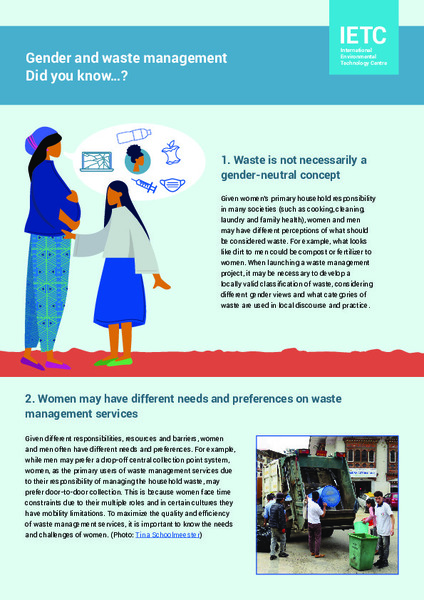| dc.contributor | Economy Division | en_US |
| dc.contributor.author | United Nations Environment Programme | en_US |
| dc.contributor.author | International Environmental Technology Centre | en_US |
| dc.date.accessioned | 2022-12-27T05:29:14Z | |
| dc.date.available | 2022-12-27T05:29:14Z | |
| dc.date.issued | 2022-12 | |
| dc.identifier.uri | https://wedocs.unep.org/20.500.11822/41531 | |
| dc.description | Contents: 1. Waste is not necessarily a gender-neutral concept. 2. Women may have different needs and preferences on waste
management services. 3. There is a clear gender division of labour in the waste sector. 4. Women’s gender responsibility for community cleanliness is often uncompensated, and when these voluntary activities become paid, women are often left out. 5. Formalizing waste activities can also force women out of work. 6. Gender aspects are left out in the selection of technology. 7. Women are exposed to specific health risks in various ways. | en_US |
| dc.format | pdf | en_US |
| dc.language | English | en_US |
| dc.language | Japanese | |
| dc.rights | Public | en_US |
| dc.subject | gender | en_US |
| dc.subject | gender mainstreaming | en_US |
| dc.subject | animal waste management | en_US |
| dc.title | Gender and Waste Management: Did You Know…? | en_US |
| dc.title.alternative | ジェンダーと廃棄物管理: ...知っていますか? | en_US |
| wd.identifier.sdg | SDG 3 - Good Health and Well-Being | en_US |
| wd.identifier.sdg | SDG 5 - Gender Equality | en_US |
| wd.identifier.sdg | SDG 10 - Reduced Inequalities | en_US |
| wd.topics | Chemicals and Pollution Action | en_US |
| wd.identifier.pagesnumber | 5 p. | en_US |



